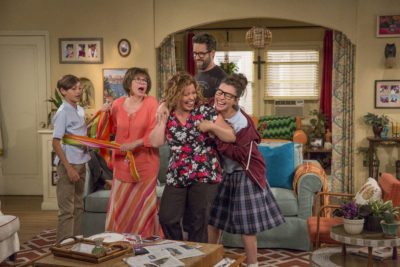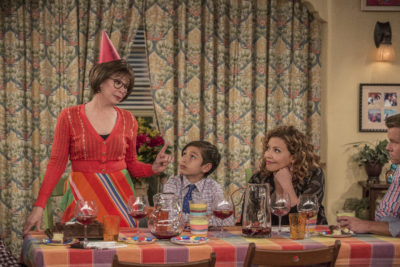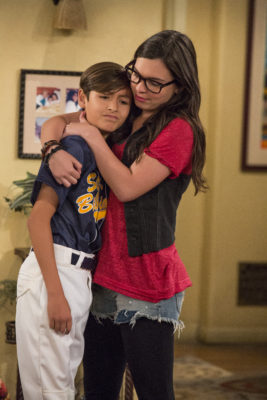
One Day At A Time – L-R – Marcel Ruiz, Rita Moreno, Justina Machado, Todd Grinnell, Isabella Gomez Photo courtesy of Netflix
Unlike another revived/sequelized sitcom at Netflix (*cough*FullerHouse*cough*), the new One Day at a Time is not just a great sitcom, it’s proof that revivifying an old show doesn’t mean it has to be limited by the constraints of the original.
In this case, the new series is – at the very least – a match for the original in virtually every way.
The Cuban-American Alvarez family is a little larger than the Romano clan: single mom/army veteran Penelope (Justina Muchado), social warrior daughter Elena (Isabella Gomez), not quite precocious son Alex (Marcel Ruiz) and Penelope’s mother, Lydia (Rita Moreno) – a fiery, religious woman with great dance moves.
Plus, of course, Schneider (Todd Grinnell) – a hipster wannabe from a rich family (he’s the building’s super because his family owns it).

One Day At A Time – l-R – Marcel Ruiz, Justina Muchado, Isabella Gomez Photo courtesy of Netflix
Penelope works as a nurse for Dr. Leslie Berkowitz (Stephen Tobolowsky), alongside ditzy blonde receptionist Lori (Fiona Gubleman) and sexist male nurse Scott (Eric Nenninger).
The family set up in what is, layout-wise, the same digs as the Romanos – though decorated entirely different, that adds a subtle bit familiarity at its base. Plus, the addition of a colorful curtain sets what was just a cool alcove up as Abuela Lydia’s cozy little room – while giving her as device for making the occasional Grand Entrance (which usually draws a good bit of laughter from the show’s studio audience).
Yes, One Day at a Time is, technically, an old-fashioned, three camera sitcom shot before a studio audience. Fortunately for all concerned, it is a brilliant old-fashioned Norman Lear sitcom, which means it goes for big laughs as part of the development of plot and first and foremost, its characters.
As an army veteran who was injured in Afghanistan, Penelope has a wonky shoulder and has to deal with a less than efficiently run VA. She suffers from PTSD and has to deal with it in a way that might not be the preferred Cuban way – which, of course, brings down Abuela Lydia’s scorn. And let’s not even talk about group therapy/support groups (Penelope would rather her mom think she was on a date than going to therapy – and as a good Catholic, Lydia is not exactly in favor of divorce).

One Day At A Time – l-r – Rita Moreno, Marcel Ruiz, Justina Machado Photo courtesy of Netflix
So, One Day at a Time deals with current issues – homophobia, sexism, misogyny, racism, sexual identity – in a familiar format that helps the audience feel like they are beginning part of the Alvarez family. Because they become familiar with and begin to care about (and relate to) the family, the issues they face become more a case of ‘we’ than ‘they.’
There’s an arc dealing with Penelope’s divorce from Victor – a fellow soldier who, unlike her, refuses to seek help for his problems with PTSD, and an arc dealing with immigration (involving Elena’s best friend, Carmen’s parents), and more.
One theme that runs throughout the first season of thirteen episodes is Elena’s quinceañera – it allows the show subtle entryways into a host of concerns, rising naturally from Elena’s not wanting one for some very specific reasons – and from Penelope and Lydia’s reactions to those reasons.
The first season of One Day at a Time may be anchored by Moreno – whose command of her talent is legendary (she can get a laugh from the most minute change of expression, the most outrageous mispronunciation, or just putting up a phot on a refrigerator – but Machado matches her note for not whether it’s over a comic sequence or exchanging her comic chops for dramatic ones in the middle of a scene (as with her first visit to her soon to be regular therapy group).

One Day At A Time – L-R – Todd Grinnell, Rita Moreno Photo courtesy of Netflix
Gomez’s Elena starts off as a very sitcomy character – bits of character played to a specific point – but gradually becomes as real in her performance as Machado and Moreno. The second half of the season finds her wrestling with some issues that lead to both heartbreak and triumph.
I haven’t said much about Grinnell’s Schneider, but as in the original show, he gradually becomes as much a part of the family as anyone. Despite his habit of mansplaining and trying way too hard, he means well and, in a way, becomes a crusader on behalf of the family – to the point where he might even be seen as an honorary Cuban (even despite that unfortunate Che t-shirt moment in the teaser for a later ep).
Dr. Berkowitz and Scott get to grow as characters, too, though they are definitely secondary characters. Tobolowsky’s Berkowitz is a good doctor, but kinda messed up outside his area of competence. He finds a kind of growth through an unexpected connection to the Alvarez family.
Scott remains a bit of a dick throughout, but Nenninger plays that as wavering as Penelope’s confidence (and quick rebuttals to his crap) appear to be making him think… just a little (and not without some effort…).

One Day At A Time – L-R – Marcel Ruiz, Isabella Gomez Photo courtesy of Netflix
Only Ruiz’s Alex remains a tiny bit of a cipher. He’s a twelve-year old boy who gets into mischief with his friends and is constantly falling back on his looks to get out of trouble. The character’s biggest plus is that almost nothing surprises him – he’s rarely shocked by anything his family’s going through, but can still get stoked over a plate of clown-face pancakes. He seems to be living in that space between innocence and the discovery that life is hard. Ruiz plays him as a confusingly energetic version of world weary.
The only character who seems to remain a sitcom device is Gubleman’s Lori. Gubleman is hilarious in the role, but the shortness of the season seems to have left her the odd person out in terms of character development. There are glimmers of potential drama in Lori and I have no doubt a second season will see that explored.
Gloria Estefan’s reworking of the original theme song, This Is It, is icing on the cake.
One Day at a Time is brilliant. It adds further lustre to Norman Lear’s already incredible career.
Final Grade: A+